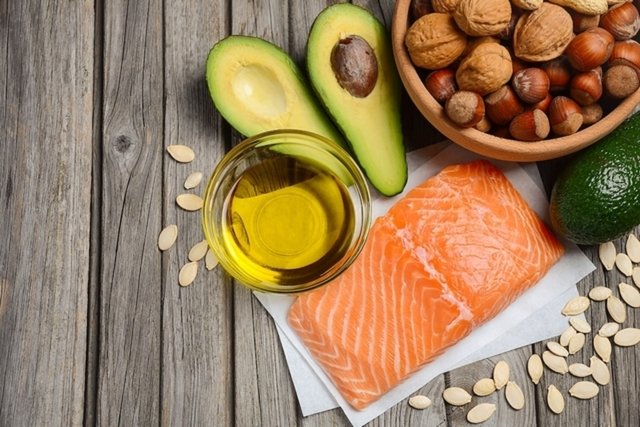The diet for arthritis and osteoarthritis should include foods that have anti-inflammatory properties, such as fish, nuts and foods rich in vitamin C and fiber. Likewise, you should avoid consuming processed foods rich in fats and sugars, such as cookies or ice cream, as they promote general inflammation in the body, including joints.
Furthermore, it is also important to consider that excess weight overloads certain joints, making it important to control your weight, either to prevent this type of disease or to improve and alleviate symptoms.
Arthritis and osteoarthritis are chronic inflammatory diseases that can cause pain in various joints of the body, and can occur in people of any age, although they are more common in the elderly.

What to eat for arthritis and osteoarthritis
Foods that help improve the symptoms of arthritis and osteoarthritis are those that have anti-inflammatory properties, the main ones being:
- Foods rich in omega 3such as tuna, sardines, trout, tilapia, herring, anchovies, cod, chia seeds and linseed, cashew nuts, Brazil nuts, almonds and walnuts, as they have anti-inflammatory properties;
- Macerated garlic and onionas they contain a sulfur compound called allicin, which provides them with anti-inflammatory, antioxidant and antimicrobial properties;
- Citrus fruitssuch as orange, pineapple and kiwi, due to the presence of vitamin C, which is necessary for the production of collagen, a protein that helps keep joints healthy;
- Fiber-rich foodssuch as vegetables and fruits with skins, and whole grains, as they help reduce inflammation and maintain the health of the intestinal microbiota;
- Red fruitssuch as pomegranate, watermelon, cherry, raspberry, strawberries and guava, as they contain anthocyanins, which are antioxidant compounds that have anti-inflammatory properties;
- Foods rich in selenium, such as eggs, French bread and Brazil nuts, since selenium is a mineral with high antioxidant and immunomodulatory power, helping to strengthen the immune system.
Furthermore, there are studies that indicate that both arthritis and osteoarthritis are more serious when the person has low levels of vitamin D, and it is also important that the person is frequently exposed to the sun, and includes foods rich in this vitamin in their daily diet. vitamin, such as fortified milk, eggs and fatty fish. Discover other anti-inflammatory foods.
In some cases, the doctor or nutritionist may consider supplementation with omega 3, zinc, selenium, vitamin D and calcium, if necessary. In addition, the use of glucosamine and chondroitin may also be indicated, which are substances that form cartilage and whose supplementation could help improve joint damage caused by arthritis.
Learn more about anti-inflammatory foods in the following video:
Foods that should be avoided
In the diet for arthritis and osteoarthritis, it is important to avoid foods that are pro-inflammatory, that is, they promote inflammation in the body, such as:
- Industrialized products rich in sugars and fats, such as cakes, stuffed biscuits, sauces in general, ice cream, sweets, lollipops;
- Fried foods and snacks;
- Alcoholic beverages;
- Sausages, such as sausages, sausages, chorizo, ham, among others;
- Fast food.
Furthermore, pre-cooked frozen foods such as nuggets, pizzas, breaded chicken, lasagna, among others, should also be avoided.
Menu option for arthritis and arthrosis
The following table provides an example of a 3-day menu with anti-inflammatory properties for the treatment of arthritis and osteoarthritis:
The quantities included in the menu vary according to age, gender, physical activity and whether or not they have any associated illness, meaning that the person must consult a nutritionist so that a complete assessment can be carried out and a nutritional plan can be drawn up. suited to your needs.
A good diet characterized by being an anti-inflammatory diet and which can be implemented in the case of arthritis and osteoarthritis is the Mediterranean diet, as it includes fresh seasonal foods, olive oil, seeds, nuts, beans, fruits and vegetables.
If you want an individualized diet according to your needs, make an appointment with a nutritionist in the nearest region:
Taking care of your health has never been easier!
Diet for rheumatoid arthritis
In the diet for rheumatoid arthritis, in addition to consuming foods with omega-3, it is also important to prioritize the consumption of foods that strengthen the immune system and have antioxidants, being rich in vitamins A, C, E and selenium, such as:
- Fruits, especially orange, acerola, lemon, guava, papaya and pineapple;
- Vegetables and greensmainly cauliflower, tomatoes, broccoli, spinach, cabbage, carrots;
- Skimmed milk and derivatives, such as low-fat yogurt, skim milk and white cheeses such as ricotta and cottage cheese.
People with rheumatoid arthritis must also maintain an adequate weight, as excess weight can cause joints to be overloaded, making pain worse. Understand better what rheumatoid arthritis is and its treatment.
Furthermore, excess fat favors increased inflammation in the body, further aggravating the disease.
Read too: 12 home remedies for rheumatoid arthritis (and how to do it)
Diet for Gouty Arthritis
In gouty arthritis, inflammation in the joint is caused by the accumulation of uric acid. The diet for this type of arthritis must include foods with anti-inflammatory properties, however, it is important to avoid consuming foods that can increase the concentration of circulating uric acid, such as red meat, liver, heart and drinking beverages. alcoholic. Learn more about nutrition for gout.
Bibliography
- UNIVERSITY OF COLORADO HOSPITAL. Supplements for the Treatment of Osteoarthritis. Disponível em: <https://www.ucdenver.edu/docs/librariesprovider65/clinical-services/sports-medicine/supplements-for-the-treatment-od-osteoarthritis.pdf?sfvrsn=81345bb9_2>. Acesso em 12 set 2023
- KUANG, Xiaoqing; CHIOU, Jiachi et al. Magnesium in joint health and osteoarthritis. Nutrition Research. Vol.90. 24-35, 2021
- CLEVELAND CLINIC. Collagen. Available at: <https://my.clevelandclinic.org/health/articles/23089-collagen>. Accessed on 08 Sep 2023
- DE PHILLIPO, Nicholas; Aman, Zachary et al. Efficacy of Vitamin C Supplementation on Collagen Synthesis and Oxidative Stress After Musculoskeletal Injuries: A Systematic Review. Orthopaedic Journal of Sports Medicine. Vol.6. 10.ed; 1-9, 2018
- XIN, J; DING, C et al. Effectiveness of vitamin D supplementation on knee osteoarthritis – A target trial emulation study using data from the Osteoarthritis Initiative cohort. Osteoarthritis and Cartilage. Vol.30. 1495-1505, 2022
- KOSTOGLOU-ATHANASSIOU, Iphigenia; Athanassiou, Panagiotis et al. Vitamin D and rheumatoid arthritis. Therapeutic Advances in Endocrinology and Metabolism. Vol.3. 6.ed; 181–187, 2012
- MARKS Ray. Vitamin D and Osteoarthritis Pain. CPQ Orthopaedics. Vol.3. 6.ed; 1-17, 2020
- Marchesino, M.A et al. The frying processes and their relationship with nutritional values and safety: a comprehensive vision from food safety . Faculty of agricultural sciences. Vol.8. 1.ed; 2020
- VAN DE LOO, J, A, E, Aurora et al. The Inflammatory Response to Alcohol Consumption and Its Role in the Pathology of Alcohol Hangover. Journal o fclinical Medicine. Vol.9. 1-12, 2020
- EUROPEAN RESEARCH COUNCIL-EUROPEAN UNION. The health impact of food additives. Available at: <https://erc.europa.eu/projects-statistics/stories/health-impact-food-additives>. Accessed on Aug 2, 2023
- EUROPEAN FOOD SAFETY AUTHORITY. Nitrosamines in food raise a health concern. Available at: <https://www.efsa.europa.eu/en/news/nitrosamines-food-raise-health-concern>. Accessed on Aug 2, 2023
- ARTHRITIS FOUNDATION. Nutrition Guidelines for People With Rheumatoid Arthritis. Disponível em: <https://www.arthritis.org/living-with-arthritis/arthritis-diet/anti-inflammatory/rheumatoid-arthritis-diet.php>. Acesso em 19 set 2023
- ARTHRITIS FOUNDATION. Nutrition Guidelines for People With Rheumatoid Arthritis. Disponível em: <https://www.arthritis.org/living-with-arthritis/arthritis-diet/anti-inflammatory/rheumatoid-arthritis-diet.php>. Acesso em 23 out 2019
- VITETTA Luis et al. Dietary recommendations for patients with rheumatoid arthritis: a review. Nutrition and Dietary Supplements . 4. 1-15, 2012
- MAHAN, L. Kathleen et al. Krause: Food, Nutrition and Diet Therapy. 13.ed. São Paulo: Elsevier Editora, 2013. 908-909.
- SHILS Maurice. Nutrition in Health and Disease. 9th. Mexico: Mc Graw Hill, 2006. 1550-1553.
- ARTHRITIS FOUNDATION. Glucosamine and chondroitin sulfate. Available at: <http://espanol.arthritis.org/espanol/tratamientos/terapias/terapias-alternativas-complementarias-glucosamina/>. Accessed on October 23, 2019
- COZZOLINO Silvia. Bioavailability of nutrients. 4th. Brazil: Manole Ltda, 2012. 726.

Sign up for our newsletter and stay up to date with exclusive news
that can transform your routine!
Warning: Undefined array key "title" in /home/storelat/public_html/wp-content/plugins/link-whisper-premium/templates/frontend/related-posts.php on line 12
Warning: Undefined array key "title_tag" in /home/storelat/public_html/wp-content/plugins/link-whisper-premium/templates/frontend/related-posts.php on line 13




